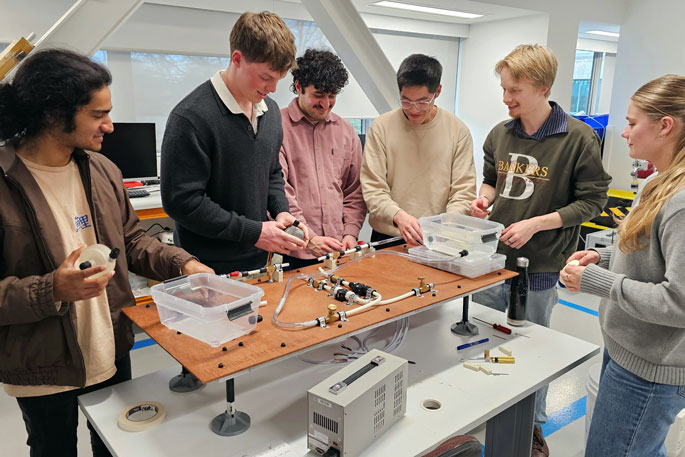A team of UC students are in Japan for the global Heart Hackathon, a competition to build a fully operational artificial heart.
An estimated 17.9 million people globally die due to heart disease each year, and with only 5000 hearts available for transplant, it is believed that a fully artificial heart could benefit 60,000 patients awaiting heart transplants.
The Heart Hackathon awards prizes for innovation, practical feasibility, and commercialisation potential, encouraging teams to bring new ideas to a field that could transform cardiovascular medicine.
Associate Professor Debbie Munro founded Te Whare Wānanga o Waitaha | University of Canterbury UC BIOMED Club in 2019. The club’s goal is to contribute to the creation of an artificial heart that can replicate the complex mechanics of a human heart while ensuring it is safe, effective, and accessible.
“We have developed a versatile prototype, allowing us to test various blade geometries that mimic the blood flow patterns essential for heart function,” said UC Bachelor of Science student and UC BIOMED Club president Jayden Hunt-Hoskin.
“We’re creating a foundation that future teams can build on, focusing not only on innovation but also on manufacturability and long-term feasibility. With a waterproof, modular design, the current prototype allows for ongoing adjustments and improvements.”
Associate Professor Munro, who leads the Minor in Biomedical Engineering at UC, says the key to both the club and any future solutions must be diverse and multi-disciplinary.
“We started this club to create a space where students interested in biomedical engineering could come together and work on meaningful, real-world problems. It’s been incredible to see how far we’ve come.
“We want to make sure our club is inclusive and attracts talent from all backgrounds – it’s essential for solving the kinds of complex problems we’re working on.
“We attract a very diverse cohort, and that’s exactly what we want – to bring more voices to the table because that’s how we get the best solution. Our very own club president [Jayden] is a Science student, and women make up a third of the club.”
With higher rates of heart disease for Māori populations, Associate Professor Munro knows this project cannot be a success without inclusivity and differing cultural perspectives.
“Including Māori perspectives in our design process is critical. We want our artificial heart to be not only functional but also culturally sensitive.”
The team is also looking externally to ensure the ongoing success of the project, she says.
“We hope to secure further external funding to sustain this work long term, so our team can continue, and we are also looking for experts who may wish to join the project.”



0 comments
Leave a Comment
You must be logged in to make a comment.